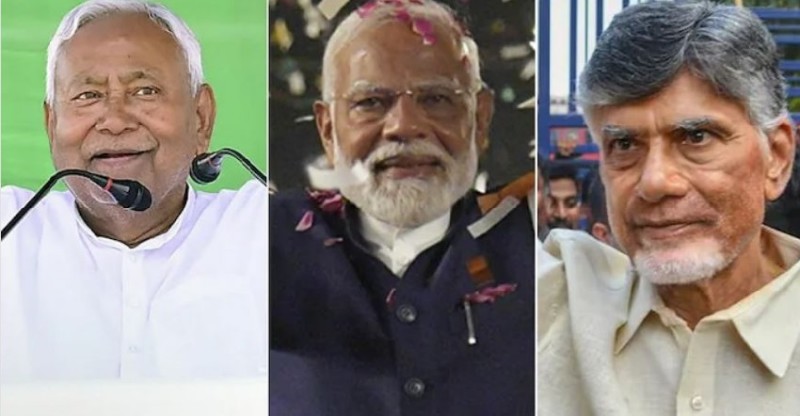
Nitish Kumar’s Janata Dal (United) and Chandrababu Naidu’s Telugu Desam Party (TDP) are pivotal players in the post-election scenario, holding 28 seats between them and wielding significant influence over the BJP-led National Democratic Alliance (NDA). Both parties have reaffirmed their commitment to the NDA and confirmed their participation in the alliance’s upcoming meeting on Wednesday. Despite this, the INDIA bloc, falling short of the majority mark by about 40 seats, continues to seek their support.
In his victory speech at the BJP headquarters in Delhi, Prime Minister Narendra Modi acknowledged the pivotal role played by Kumar and Naidu in the NDA’s success in Bihar and Andhra Pradesh. On his social media handle, Naidu expressed gratitude to the people of Andhra Pradesh for their strong mandate, emphasizing their trust in the alliance’s vision for the state’s development. He stated, “Together with our people, we shall rebuild Andhra Pradesh and restore its glory.”
In contrast, Bihar Chief Minister Nitish Kumar did not make any public statements, and reportedly declined to meet with Bihar BJP president Samrat Chaudhary despite repeated attempts on Tuesday. His actions have sparked speculation, particularly amidst rumors that leaders from the INDIA bloc have approached him for support.
Both Naidu and Kumar have a history of occasional disagreements with Modi. In March 2018, the TDP, previously part of the NDA, severed ties with the BJP over the denial of special category status to Andhra Pradesh. The TDP later moved a no-confidence motion against the Modi government and allied with the Congress and other opposition parties ahead of the 2019 elections. Naidu rejoined the NDA just before the 2024 elections.
The TDP, under Naidu’s leadership, was the first NDA ally to demand Modi’s resignation as Chief Minister following the 2002 Gujarat riots. The party adopted a critical resolution against Modi for his handling of the violence and the subsequent relief efforts. Similarly, in June 2013, Nitish Kumar ended his association with the BJP after Modi was appointed as the BJP's campaign committee chief for the 2014 Lok Sabha elections, citing the need for a "secular prime minister." Both leaders have also been part of coalition governments in the past.
This scenario highlights the delicate balancing act ahead for Kumar and Naidu, who are now key players in determining the future course of the government formation in India.
Narendra Modi and Allies to Strategize Today After Election Setback
Election Party-wise Round Up: BJP Secures 240 Seats, Congress Wins 99, and More
Modi's BJP Falls Short of Majority in India Election Upset, Coalition Govt Likely